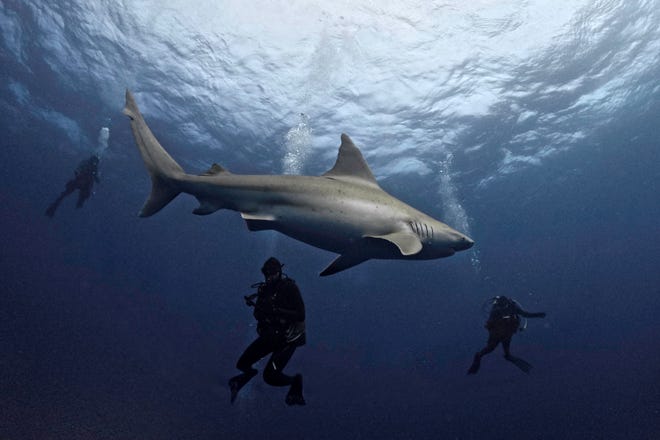Two “highly rare” shark attacks off the coast of Florida last week left several people injured, but experts say beachgoers need not worry.
Three people were injured in two recent attacks at two beaches across the state within just an hour and a half on Friday. The first victim was a 45-year-old woman who was attacked by a shark while swimming with her husband off the first sandbar at Water Sound beach. She lost part of her left arm and suffered “significant trauma” to her torso. Water Sound is about 120 miles west of Tallahassee on the Gulf Coast.
Two girls, ages 15 and 17, were attacked while swimming in waist-deep water with friends about four miles off the coast of Fort Walton, with one suffering “severe injuries” to her hands and feet and the other suffering minor injuries to her legs.
In a third attack that same day, a 25-year-old woman was attacked by a shark near the Hawaiian island of Oahu and taken to a trauma hospital in critical condition.
“It’s extremely unusual to have three casualties in one day,” South Walton Fire Chief Ryan Crawford said at a news conference Friday.

more:Tiger shark vomits entire spiky land creature in rare sighting: ‘Spine and legs and all’
Experts say more people in the water means more attacks
Shark attacks and deaths have risen in the past year, but experts say the recent figures are not unusual.
Researchers from the International Shark Attack File, part of the University of Florida’s Florida Shark Research Program, confirmed 69 accidental bites worldwide, up from the five-year average of 63, with 52 percent occurring in the United States, including 16 in Florida. Ten people died as a result of the attacks, five more than the previous year.
Gavin Naylor, research program director and file custodian, said shark bites have fallen so far this year. “They were very low this year but are now trending up,” he said.
Naylor said warm weather brings more people into the water, increasing the chances of being attacked.
Bait fish that sharks feed on in the Florida area also swim closer to shore, increasing the risk of shark encounters, Naylor said. “Sharks eat their normal prey while humans are swimming in the water, and it’s right next to where humans are, so incidents happen,” Naylor said.
Local authorities still consider the series of attacks an emergency.
South Walton Fire Department spokeswoman Mackenzie McClintock called last week’s incident “very rare,” saying the last fatal shark attack in her department’s jurisdiction was nearly a decade ago, in 2005.
“This is something we’ve never seen before,” she added, saying between 20 and 30 personnel, including medical personnel who arrived by helicopter, responded to the attack.
Walton County Sheriff Michael Adkinson said at a press conference Friday night that the two seriously injured victims “are expected to survive.”
In a post on fundraising website Caring Bridge, the mother of the teenage girl injured in the attack said she rushed to the shore with a friend after hearing about the shark and found her daughter on the ground, “with her eyes closed, her mouth white and blue, dead.”
“The scars on her legs, or whatever was left of them, were like something from a movie,” she wrote.
A family spokesman declined to comment further to USA Today.
more:Pair of giant great white sharks surface within a minute of each other off the coast of Florida
Florida-based bull sharks may be behind the attack
McClintock said authorities didn’t want to speculate on what type of shark was behind the attack, but Naylor said it was almost certainly a bull shark, which he said is one of two species that swim near Florida’s coastline, along with tiger sharks.
He said local police told him after the attack that drone footage had captured a bull shark swimming close to shore – and that there could be 60 to 70 sharks swimming close to the coast every day.
“This is not unusual. They’re just minding their own business,” he said.
Improved water quality may also be contributing to shark attacks, according to the university’s shark researchers, such as the first reported shark attacks in more than half a century reported around New York City last year.
The attack, which happened in August on Far Rockaway Beach in Queens, left a 65-year-old woman seriously injured. New York authorities said several other shark bites had been reported earlier in the summer.
Fire officials on Sunday warned beachgoers “not to underestimate the water and the marine life that may be there” after the two attacks. Lifeguards at Dune Allen Beach continued to fly purple flags, which indicate the presence of dangerous marine life. Officials also closed the beach for less than 24 hours.
Cybele Mayes-Osterman is a breaking news reporter for USA Today. Email her at cmayesosterman@usatoday.com. Follow her at X @CybeleMO.

